|
|
|
Sort Order |
|
|
|
Items / Page
|
|
|
|
|
|
|
| Srl | Item |
| 1 |
ID:
025042
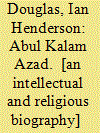

|
|
|
|
|
| Publication |
DelhI, Oxford University Press, 1988.
|
| Description |
xii, 358p.Hbk
|
| Standard Number |
195622057
|
|
|
|
|
|
|
|
|
|
|
|
Copies: C:1/I:0,R:0,Q:0
Circulation
| Accession# | Call# | Current Location | Status | Policy | Location |
| 029477 | 923.254/DOU 029477 | Main | On Shelf | General | |
|
|
|
|
| 2 |
ID:
123033
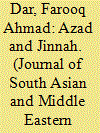

|
|
|
| 3 |
ID:
140458
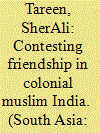

|
|
|
|
|
| Summary/Abstract |
This essay examines competing understandings of ideal publics in modern South Asian Islam by analysing a polemical debate among Muslim scholars about the boundaries of friendship between Muslims and non-Muslims. The specific context of this polemic was the pan-Islamic Khilafat movement and concomitant debates on the limits of friendship between Muslims, the British and Hindus. Through a close reading of this polemic, I show ways in which Muslim normative sources are mobilised and interpreted for radically contrasting ideological and political projects. The specific focus of this essay is on intra-Muslim contestations surrounding the category of muwalat (friendship or clientage), and it shows the opposing ways in which this category was approached by Indian Muslim scholars as either friendship between different religious communities or in terms of a citizen's relationship to a modern state. These varied understandings of muwalat, I argue, corresponded to diverging imaginaries of a moral public. This essay particularly focuses on the thoughts of the towering Indian Muslim scholars, Ahmad Raza Khan (d. 1921) and Abul Kalam Azad (d. 1958).
|
|
|
|
|
|
|
|
|
|
|
|
|
|
|
|
| 4 |
ID:
167091
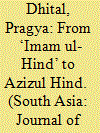

|
|
|
|
|
| Summary/Abstract |
This paper discusses the efforts of two Indian Muslim journalists, Abul Kalam Azad (1888–1958) and Aziz Burney (1952–), to use and overcome the constraints of direct and indirect censorship in order to address a community (qaum) conceived in their own image. It deals with these attempts through their responses to a series of national- and international-level crises, and to political groups that attempted to unite Hindus and Muslims. These include the nascent Khilafat movement, which was key to their coming together in the independence struggle and the Congress Party, and Congress’ ambiguous relationship with Muslims in the post-Independence period.
|
|
|
|
|
|
|
|
|
|
|
|
|
|
|
|
| 5 |
ID:
025039
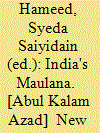

|
|
|
|
|
| Publication |
New Delhi, Indian Council for Cultural Relations, 1990.
|
| Description |
xiv, 335p.Hbk
|
| Contents |
Centenary Vol.2 : Selected speeches and writings of Maulana Abul Kalam Azad
|
| Standard Number |
8185434026
|
|
|
|
|
|
|
|
|
|
|
|
Copies: C:1/I:0,R:0,Q:0
Circulation
| Accession# | Call# | Current Location | Status | Policy | Location |
| 032704 | 923.254/HAM 032704 | Main | On Shelf | General | |
|
|
|
|
| 6 |
ID:
102542
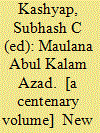

|
|
|
|
|
| Publication |
New Delhi, National Publishing House, 1989.
|
| Description |
xii, 200p.
|
|
|
|
|
|
|
|
|
|
|
|
Copies: C:1/I:0,R:1,Q:0
Circulation
| Accession# | Call# | Current Location | Status | Policy | Location |
| 055729 | 923.254/KAS 055729 | Main | On Shelf | Reference books | |
|
|
|
|
| 7 |
ID:
147205
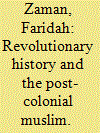

|
|
|
|
|
| Summary/Abstract |
This paper takes the ‘Silk Letters Conspiracy’, a complex, transnational scheme uncovered by British colonial officials in 1916, as the starting point for a discussion on the writing of revolutionary histories in post-colonial India. It considers the generally vexed position of Muslims in histories of early twentieth-century anti-colonialism and the lengths to which some scholars, particularly those associated with the Deoband seminary in northern India, have gone in response in order to create a counter-narrative of Muslim revolutionary anti-colonialism that was fully in keeping with the broader nationalist struggle. Later, the paper speculates on whether other historical lives, such as that of Abul Kalam Azad, one of the most high-profile Muslims in the leadership of the Indian National Congress in the 1940s and 1950s, could also be so re-inscribed and made part of the revolutionary script of the 1910s, and to what end this might be done. Throughout, this article meditates on the problematic nature of testimony, memory and the colonial archive.
|
|
|
|
|
|
|
|
|
|
|
|
|
|
|
|
|
|
|
|
|